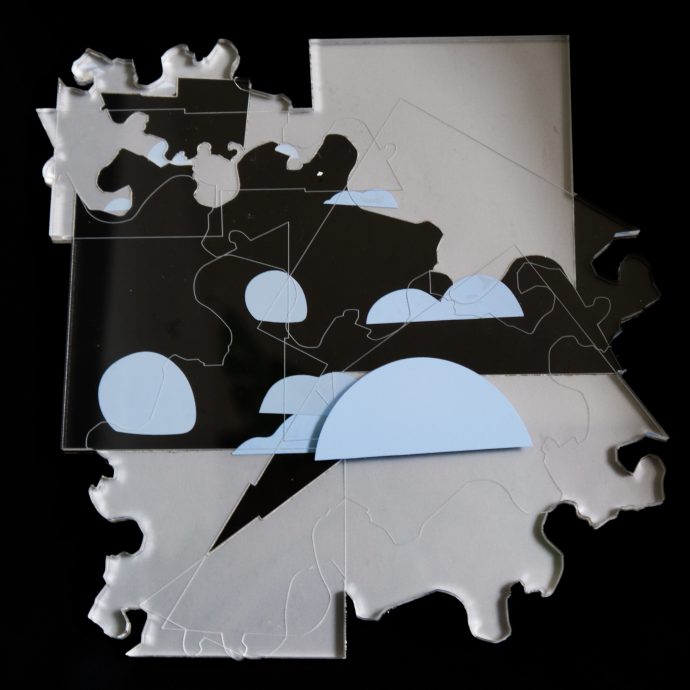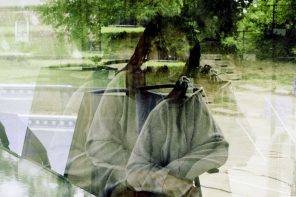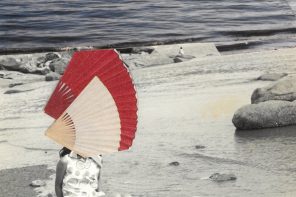It’s often said that a daughter searches for a husband who complements her father or fulfills those fragments which sorely her father lacks. She tries to find similarities and dissimilarities. There is a riddle to be solved in searching for a groom or a mate. So, before I met F, I had already had a lot of sex. He was a riddle that I wanted to solve but not through my body. F turned out to be a Russian doll. When I met him, he was a virgin and I was not. I think I must have loved him how I could not love my previous lovers who all took a piece of me in filling their cups of experiences while F waited for the right time. The drawback, which held my head underwater, was shame and the right person for F. He had the right reasons. Something you (Daddy) would laud.
To Daddy—
Jahan tak nazar jaati hai, wahan tak sab apna hai. (As far as you can look, everything is ours.)
You never said this to me. We did not own much anyways.
When I asked you why we could not meet at dusk, you said dusk should meet us instead. I remember the day when I turned the page six of our Times of India. Ours, because you, Papa (as F called his dad), and I, we both read Times like it was only sent to our home, for us to be read, page by page. You focused on the headlines and the business page of the colonial newspaper, and I, first in school, only read the gossip columns, and then, after I decided I was to study science in eleventh and twelfth, I started reading the editorials. An English teacher whom you introduced me to, thinking that this was an opportunity you had never gotten as a child, told me to read Speaking Tree. At first, I didn’t. But when I was in law school that is all I ever read.
Law of love, I searched for and found you (Daddy). Then I found a hypothesis in love, and then the idea of love itself when I met F.
To F—
You did not drink but you had shared trivia with me over Sprite, which we both did not like. We crackled at the Sprites we had for drinks that were not Classic (Coke). We had wanted Coke, but we got Sprite and heads nodding noes. You said champagne burnt if kept in the freezer for too long, and when I asked you how you knew this, you had said your sister told you this. You had lied. Like a good Mussalman.
You told me once, as we were pacing in treads alongside Sabarmati, how Ahmedabad was built on a quake-shouldering river and we had made peace with tremors and hemispheres of shame, electric currents. Soon, I would be standing alone on the periphery, overlooking the parts where the river had dried and buildings had birthed and sighed. You became a ghost, a past, not my first, nor my last.
We preened the city; you clogged the memories. Densest of memories, tying knots and ruins of an old city inside us, young. You did not hold my hands or utter words when we were in the city. You waited for corners. You waited for turns. I waited for your hand.
Hariyupiya of the Rigveda, you murmured once, and I felt less of a Hindu, standing in a dilapidated museum of lost memories. I never asked you what it meant. I had gone home that day, not thinking of you. I had searched the travesties of the internet, but I had failed at dawn to know the only thing I knew you did and I did not.
You once took me to a flea market and asked me if I knew what home was. I said that home was anything but four walls. We both took something with us from the market, calling it home, Sturt’s desert roses falling on us, a native fig falling into my lap from across the beyond. You smiled, I smiled. We called it home. This would be the last time we called something ours.
A striped mint brush pressed in a book you gave me still sits striped, tight between pages 46 and 47. Whenever I open the book, I open pages 46 and 47. I never got the chance to open you. We only pressed our lips against each other, tight, tight. We left the chance to open hearts for the season of silver tails. Which never came. You left before even the banksia dried on the ground. You left as soon as the goldenrain tree arrived, just when the tree turned yellow. At dark yellow, I cried.
You had once called me on the phone. I remember now. Papery seed pods fell out of my lap onto the ground, a chirabilva was calling a kesudo home.
I remember Father and I used to walk in gardens, collecting neem, spongy cotton pods which are natural loofahs, and tulsi for chai-patti and father never plucked any beautiful flowers. But I did. You did not either. My father could be yours; I knew.
Once, you plucked some neem, chewed it, spat it out. I gulped it. For the first time, I did not spit it out and I wasn’t even asked to chew.
When I had sinus surgery, you put your finger on my sinus, in between the ear and the space between the head, pressing your fingers indulgently. I was amused and asked you what you were trying to accomplish. You told me you could hear my heartbeat through my sinus. I believed you, and now, every time I miss you, I press my thumb against my sinus and my heart beats just like it did when you touched. Here, something has not changed between us.
Because you were a philatelist, everyone gave you stamps. I strongly decided against it. I knew what I was supposed to give you. While everyone focused on your love of collection, I focused on your love. We never kissed after that. And I still owe you philately.
Even a bookstall harbors the energy of a huge bookshop, books falling off its edges. You and I fell off a bench once. Gravity tricked me into thinking that it was fate, love, us, falling.
You were complicated, a mess when you returned. I helped you with writing your assignments. Now there was a way you wrote about tambourines, little furry animals, and shooting stars shaped like a wave. You drew better. You were better. I saw you click better pictures and write better after you went away. I knew I had to get away to do better, too. There was a way I was searching for to write about my father. We both had to be on different ends of the planet to do what we needed to. We never got better.
Jahan tak nazar jaati hai, wahan tak sab apna hai, you had said proudly as I looked out from my passenger side of the new red car you were driving. Maybe that was the only time I did not see my father in you. The times you smoked, rolling tobacco, smelling of tobacco, were when my teetotaler father was least present in you.
Dear F, may you always find gardens and gardens find you, and I know that your skull cap might not understand my tilak, but we both agreed that a larger forehead made for a better life. Eavesdropping at the Amul Café, you used to buy two kinds of drinks. Not offending your hours at the gym, you used to hand me both. I would offer you a sip after every sip, but you turned them down, nonchalantly. I didn’t come to drink chocolate milk, and I knew your love was like my father’s.
I remember we hyperventilated looking at bougainvillea, and you held my pinky finger in yours, we barely touched our palms. Now reading astrology, I understand that touching palms together transmits energy, and this transfer matters in larger schemes of things, like a connection forming, a bud developing, two twin flames recognizing, and souls reconnecting. But we never touched our palms, we were safe from formations we could not have respected or maintained. Our spirits would have haunted us forever. Now, only our words do. Memory soon to be forgotten.
Panel after panel of miniature frescos with natural dye in gilded borders greeted us once when we ran away from the sky to shield ourselves from the rain. I remember wondering if my wet dress made my nipples visible, but you just admired the frescos, naked in obliteration. Who knew that in a few months, you would go to study architecture, and I would be writing poems?
We only bring people here who are important, said an ancient caretaker of a restaurant which housed some artifacts, and you had asked if a certain piece with its breasts covered was from the Mughal era. To which the curator had replied, Actually, nobody knows. I thought it was definitely Vedic.
I once called you from a cemetery, and you told me that it was disrespectful, so I hung up. We did not talk for a couple of days, and I remember that was the first time I called my father without him calling me first or me returning his calls. I had shouted at him, and when the call ended, I cried into an already wet pillow.
You were Lee to my Nancy. We never drank and smoked together but I drank and smoked with every other guy I met after . . .
I cheered you from the sidelines, the bocas, when you finally found the girl you could marry. You told her you liked me. But I know you loved me.
To Daddy—
Coming back to page six, you pointed out to me, in a manner only you can, that I was not to marry a Mussalman, a man sporting a white hat on his skull. I was free to look into other communities but not a Muslim. You politely told me that sin would cost him his life. How could I not feel bad? How could I not see my father begging and scolding me in the same sentence construction of a seeming request?
I met F, fair, strong, and like you, full of pride and head. I met him and loved him in my heart, but only ‘til that certain sweet spot, where I could disengage. He and I, we both knew, were doomed. We had smiled at each other, nodded our heads, and sat in silence, day after day. But what we did was really think of both our parents, and I know this, that we both thought alike. When F snatched his hands away from mine and told me that he would love to marry me but could not, I realized that he was you. But you would never want him to be you, so I could only clasp my empty hands together.
I had let a certain happy marriage procession past us. Walks in the various gardens, Amul Café, past us. I had let our coffee get cold at a junction where, seven days later, F told me he would be leaving for Australia. I had cried after I went home. I knew you knew that I was broken without ever knowing if I lost my virginity or if I had ever kissed a guy. Without ever knowing about F.
I remember you asking me if I was okay. That two-syllable word, pronounced in a whisper, was too warm for me to answer that I was not okay. I learned from man after man that they will never be you, and they all battered me in ways you could not. But all did batter me. My first boyfriend loved rockets, and he knew I loved to write, but he never hired me to write for his rocket ship companies. But he did tell me once that he would take his revenge because I had ditched him for someone else. I remember my third boyfriend smiling at me, giving me a rich, jade-stoned clutch with flowers of every season imprinted on it, and how I had missed you and F.
In the RBI SO legal exam I took when F returned, which asks for 50 questions to be answered in 20 minutes, I read the questions rapidly, in under one minute, 1000 words, fastest you say, but it is really just that fast. Time flies fast. I was brought like that. I can only muster some courage to think and pray that I find some familiar questions in the exam, like the name of a book by a famous author which won prize so-and-so, or the name of a child who won the first prize, as young as she could. I remember her from the first page, lower side column on the left of TOI, where I know my eyes wandered even before they saw the headlines.
You had wanted me to remember all the formulas and permutation combinations. I wonder if, someday, I might please someone like you by knowing what you like and why not.
When I cleared the exam, I was called for the highly anticipated interview in Mumbai, the same day F went back again—the highest marks in the written exam, said the RBI site. Permutation.
It was like going to meet F. Like he never went to Australia and we were high. Like we were both at the terminal, waiting to fly. Combination.
Then they told me I was two months short of the required twenty-four months of work experience. I was not able to give the interview.
F flew away.
I called you and cried.
Shalini Singh, an ex-lawyer from Gandhinagar, India, started writing and reading before she started excelling at math, and even though she is good at math, she studied law while doing all kinds of odd writing jobs. Shalini was recently longlisted as 20 Under 30 Writers from South Asia by The Bombay Review for her piece, “Float and You Shall Be Ambergris.” She believes in love which dies, smells which confiscate, and good food—or a vice—that comforts a writer at the end of a long weary day.



